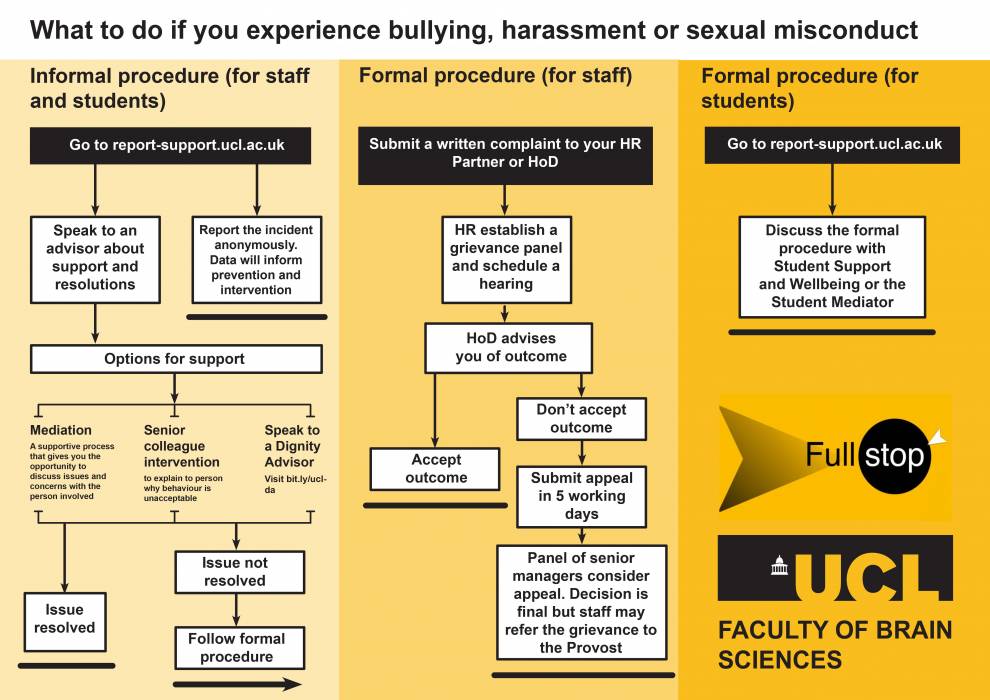The UCL Queen Square Institute of Neurology aims to be an inclusive and supportive workplace that nurtures staff and students to reach their full potential.
- Our vision for our workplace
Commitment: We have a strong commitment to equality, diversity and inclusion, supported by visible and effective leadership.
Inclusiveness: We will promote an inclusive workplace by identifying and enabling the sharing of good practice across teams and individuals.
Integrity: We will maintain the integrity of judgements and inspire trust by being honest, ethical, and taking responsibility for our actions.
Transparency: We will communicate with each other and outside stakeholders in an open and transparent manner. Our decisions must stand up to scrutiny and be impartial.
Respect: We embrace diversity and inclusion and treat each other with dignity and respect.
Equality & Diversity: We will value and celebrate the diversity of our staff and student body and ensure that equality of opportunity is afforded to all.
Ethical: We will ensure all ethical standards are maintained to ensure professional and responsible behaviour.
- Expected behaviours
Diversity in recruitment: We are committed to attracting, developing, engaging and empowering a diverse community who are motivated to fulfil their potential and our vision.
Accountability: Each employee has a responsibility to promote a supportive and positive workplace towards our vision.
Respect: We respect and value diversity and the unique contributions that foster a trusting, open and inclusive environment. All staff are obliged to work with colleagues, students and other stakeholders with respect, courtesy, professionalism and politeness.
Fairness: Members of staff can expect to be treated fairly irrespective of age, disability, gender reassignment, marriage and civil partnership, pregnancy and maternity, race, religion or belief, gender or sexual orientation.
Privilege: Be aware of the privileges you may carry and be considerate towards those who might not have the same privileges as you. Mobilise your privileges in authentic allyship to give a voice and safe space to those who do not have the same advantages.
- Unacceptable behaviours
Bullying: This construe offensive, intimidating, malicious or insulting behaviour, including an abuse or misuse of power through means that undermine, humiliate, denigrate, or injure the recipient.
Harassment: Harassment includes speech or behaviour that is not welcome or is personally offensive in relation to a relevant protected characteristic which has the purpose or effect of violating an individual’s dignity or creating an intimidating, hostile, degrading, humiliating or offensive environment for that individual. Harassment may be established from a single event.
Intimidation: Behaviour aimed at or resulting in the victim’s dignity being affected constitutes intimidation. It creates a threatening, hostile, insulting, humiliating or hurtful environment.
Sexual harassment: Any undesirable sexual advances in the form of requests for sexual favours or other verbal, non-verbal or physical behaviour with sexual connotations that is aimed at, or results in, the person’s dignity being affected (particularly when a threatening, hostile, offensive, humiliating or hurtful situation is created) are unacceptable. Verbal and non-verbal sexual harassment includes sexual innuendo in remarks, messages, images or gestures, the unsolicited sending or intentional viewing of pornographic images or texts in plain view of others, staring, or asking intimate questions. Physical sexual harassment ranges from grabbing someone or obstructing someone’s path to sexual assault and rape.
Aggression and violence: Any aggressive behaviour that includes verbal (name-calling, yelling or very heated arguments), physical (kicking, shoving, hitting, spitting, biting, smashing) or psychological violence (threats, intimidation, blackmail or humiliation) is unacceptable.
Unwelcome or offensive comments: Comments related to the age, appearance, body size, employment status, ethnicity, gender identity and expression, individual lifestyle, marital status, national origin, physical or cognitive ability, political affiliation, sexual orientation, race, or religion of any person are not permitted.
Exclusionary behaviours: Such behaviours isolate and discriminate against individuals and groups who are different. They may include incivility, bullying and workplace violence.
Abuse of seniority or power: Those in a position of power are expected to use their position fairly and responsibly. Any abuse of seniority or power over students, team members and colleagues will not be tolerated.

Wellbeing and Mental Health support at the IoN and at UCL
Access to information and dedicated sources of support is your right, is free of charge and is strictly confidential.
- IoN Wellbeing Champions
UCL Wellbeing Champions are responsible for supporting Wellbeing@UCL by promoting activities in local areas, encouraging colleagues to access relevant health and wellbeing opportunities, collating activity data, sharing best practice and stories of success. They can also offer advise on what is the best rout to seek support if you are feeling under duress, anxious or stressed.
The IoN Wellbeing Champions are:
- Jacky Bauer (j.bauer@ucl.ac.uk)
- Linda Taib (l.taib@ucl.ac.uk)
- Beth Allen (beth.allen@ucl.ac.uk)
- Catherine Hills (catherine.hills@ucl.ac.uk)
- IoN Mental Health First Aiders
The Mental Health First Aiders are trained to spot the early signs of mental ill-health in others. They are taught to confidently signpost someone to appropriate support, both internal and external, and they are equipped to deal with emergencies too.
The IoN Mental Health First Aiders are:
Brain Repair and Rehabilitation
- David Thomas: d.thomas@ucl.ac.uk
Clinical and Experimental Epilepsy
- Amanda Almacellas Barbanoj: a.barbanoj@ucl.ac.uk
- Dimitrios Kotzadimitriou: d.kotzadimitriou@ucl.ac.uk
- Olga Kopach: o.kopach@ucl.ac.uk
- Olga Tiurikova: olga.tyurikova.15@ucl.ac.uk
Clinical and Movement Neurosciences
- Clement Veall: c.veall@ucl.ac.uk
- Linda Taib: l.taib@ucl.ac.uk
Imaging Neuroscience
- Anjali Bhat: anjali.bhat.14@ucl.ac.uk
- Dan Bates: daniel.bates@ucl.ac.uk
- Dorottya Hetenyi: dorottya.hetenyi.21@ucl.ac.uk
- Kamlyn Ramkissoon: k.ramkissoon@ucl.ac.uk
- Kate Ledingham: kate.ledingham@ucl.ac.uk
- Maddy Scott: maddy.scott@ucl.ac.uk
- Michael Moutoussis: m.moutoussis@ucl.ac.uk
- Nadine Dijkstra: n.dijkstra@ucl.ac.uk
- Nicole Labra Avila: n.labra@ucl.ac.uk
- Sam Hewitt: s.hewitt.17@ucl.ac.uk
- Sophie Roberts: sophie.roberts@ucl.ac.uk
- Steph Mellor: stephanie.mellor.17@ucl.ac.uk
- Ulrich Stoof: ulrich.stoof.20@ucl.ac.uk
Neurodegenerative Diseases
- Alexiane Touze: alexiane.touze.20@ucl.ac.uk
- Argyro Alatza: a.alatza@ucl.ac.uk
- Coral Brown: coral.brown@ucl.ac.uk
- Edward Smith: e.j.smith@ucl.ac.uk
- Fiona Kinsella: fiona.kinsella.19@ucl.ac.uk
- Florence Gidney: f.gidney@ucl.ac.uk
- Helene Plun-Favreau: h.plun-favreau@ucl.ac.uk
- Hester Chu: hester.chu.16@ucl.ac.uk
- Imogen Swift: i.swift.17@ucl.ac.uk
- Jasmine Donaldson: jasmine.donaldson@ucl.ac.uk
- Jemima Phillips: jemima.phillips@ucl.ac.uk
- Lauren Byrne: lauren.byrne.14@ucl.ac.uk
- Sarah Aldous: sarah.aldous.14@ucl.ac.uk
Neuroinflammation
- Heather Ormsby: h.ormsby@ucl.ac.uk
Neuromuscular Diseases
- Debbie Hadley: d.hadley@ucl.ac.uk
- Elizabeth Fisher: elizabeth.fisher@ucl.ac.uk
- Jacky Bauer: j.bauer@ucl.ac.uk
- James Sleigh: j.sleigh@ucl.ac.uk
- Kully Sunner: k.sunner@ucl.ac.uk
- Rob Lesniak: r.lesniak@ucl.ac.uk
UK DRI
- Amber S Simpson: amber.simpson@ucl.ac.uk
- Aurelia Hays Watson: aurelia.watson@ucl.ac.uk
- Mireia Mato Prado: m.prado@ucl.ac.uk
Head Office
- Dimitrios Zachos: d.zachos@ucl.ac.uk
- Helene Crutzen: h.crutzen@ucl.ac.uk
- Laura Allum: l.allum@ucl.ac.uk
- Steffy Czieso: s.czieso@ucl.ac.uk
- Anna Foakes: a.foakes@ucl.ac.uk
- IoN Wellbeing i-act Practitioners for Positive Mental Health and Wellbeing
i-act Practitioners are trained to with the skills needed to be proactive in achieving an improvement in their workplace wellbeing.
- Laura Allum (Head Office): l.allum@ucl.ac.uk
- Anna Foakes (Head Office): a.foakes@ucl.ac.uk
- IoN Intranet: Wellbeing for Staff and Students
IoN intranet : staff and student wellbeing (internal to UCL staff and students)
- Support available at UCL
If you need support, please consider some of the resources available at UCL:
- UCL Mental Health support services for staff
- UCL Mental Health support services for students
- If you are experiencing mental health, psychological or emotional difficulties during your time at UCL, you can seek support through the Student Psychological and Counselling Services (SPCS). You can book same-day appointments with an advisor of the UCL Disability, Mental Health and Wellbeing (DMHW) team from Monday to Friday.
- UCL Employee Assistance Programme
- UCL Eyecare
- UCL Occupational Health and Wellbeing
- UCL Menopause guidance
- More information about health and wellbeing benefits at UCL HR
Mental Health initiatives at the IoN
- Mental Health and Wellbeing is one of IoN's strategic priorities
Mental health is a subject often neglected in Academia, with extraordinarily detrimental outcomes for scientists and scientific output. This is particularly true for young researchers, who are the most vulnerable in our community. As part of our drive to promote better outcomes at the IoN, in 2022 we aim to:
- Offer Mental Health First Aid training to more members of staff. Get in touch with us in case you would like to be trained as MHFA.
- Lead on several actions to break the silos and promote cross-departmental networks and events
- create events to normalise conversations around mental ill health in Academic settings.
Read about our EDI strategic priorities here.
Learn more about our Wellbeing Action Plan here.
- Webinar: Mental Health in Academia
Growing evidence shows we are in the midst of a mental health crisis in Academia, affecting everyone: from our students to our researchers and academics. We want to open the discussion around the stressors that lead to increased anxiety and ill mental health in academia, and what strategies we can apply for better outcomes.
Listen to our first conversation on how we can break the silence and improve mental health outcomes in our workplace (available on our Intranet).
Speakers: Professor Gipi Schiavo; Dr. Samantha De La-Rocque (both speakers offered their email contact so they can be reached out after the event by anyone who would like to further discuss this subject)
- 2024 Mental Health Awareness Week
Mental Health Awareness Week 2024
ION are hosting a programme of events centred around your wellbeing.
Being Well at UCL: initiatives and policies
- Being Well at UCL: the new staff Mental Health and Wellbeing plan 2021-22
“The COVID-19 pandemic has brought mental health and wellbeing into sharp focus, with staff confronting multiple severe challenges. Many people are facing difficulties in relation to work, health, financial security, home schooling, caring for children and other family members, and other issues. The tools detailed in the UCL Staff Mental Health and Wellbeing Plan are valuable resources that will help staff and their families come to grips with some of these serious problems.”
Professor Andrew Steptoe, Head of Department of Behavioural Science and Health, Institute of Epidemiology and Health Care
The 2021-22 Staff Mental Health and Wellbeing Plan was put together by UCL Workplace Health with support from mental health experts from UCL to improve the psychological health and wellbeing of our staff. The purpose of the original Staff Mental Health and Wellbeing Plan 2020-2021 (SMHWP) is to outline UCL’s vision and the steps to improve the psychological health and wellbeing of our staff community. This plan replaces the existing wellbeing strategy, Wellbeing at UCL launched in 2017 and includes longer term aims and interventions beyond 2021.
- Supportive policies
UCL has policies in place to help you achieve the perfect work-life balance, including:
- Financial benefits
UCL staff also enjoy financial benefits and discounts on products and services, including:
Find out more information about staff wellbeing, financial benefits, discounts, and more at the UCL HR website.
 Close
Close


